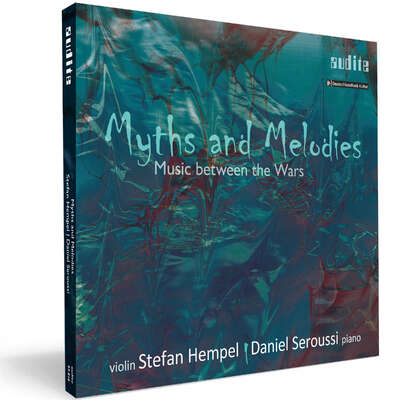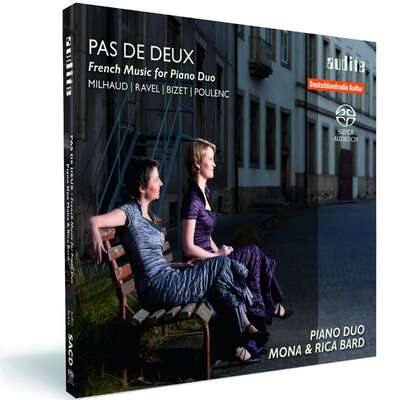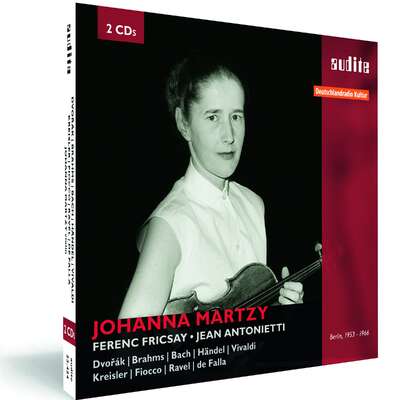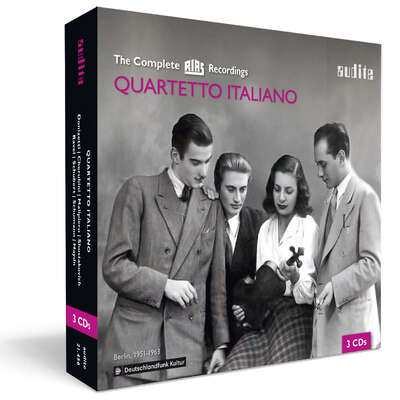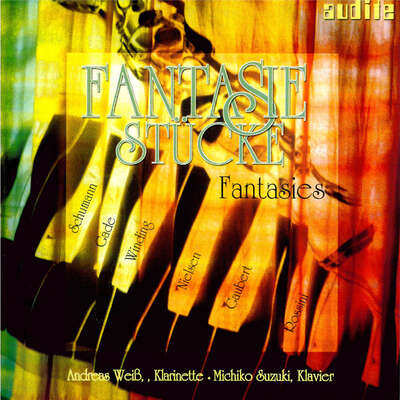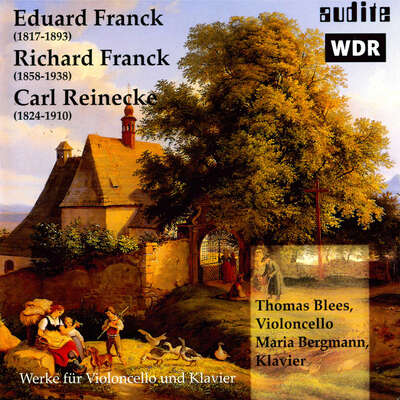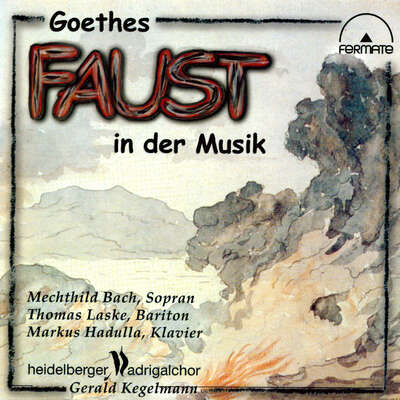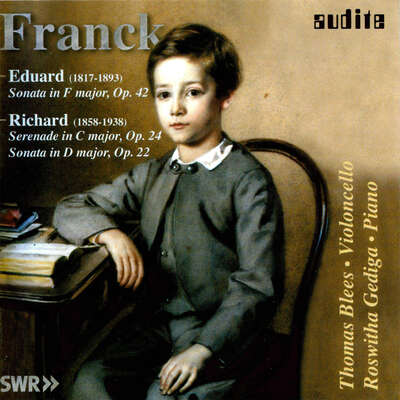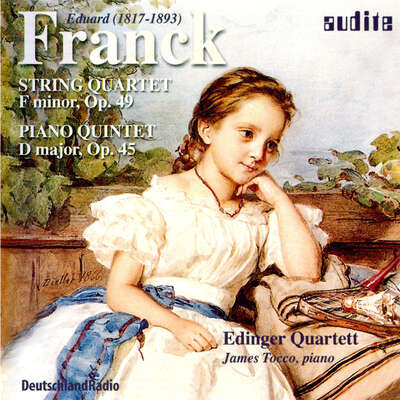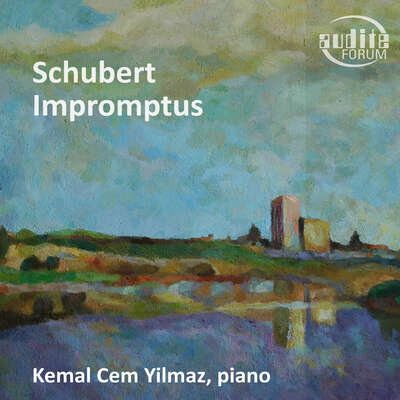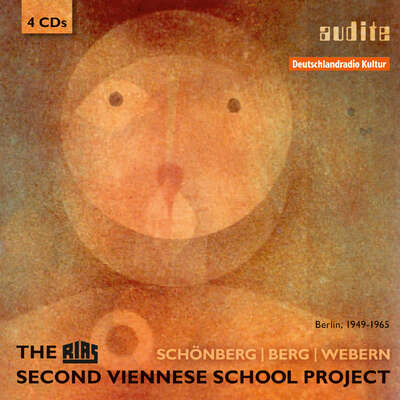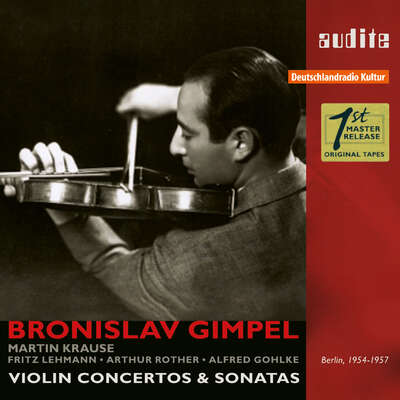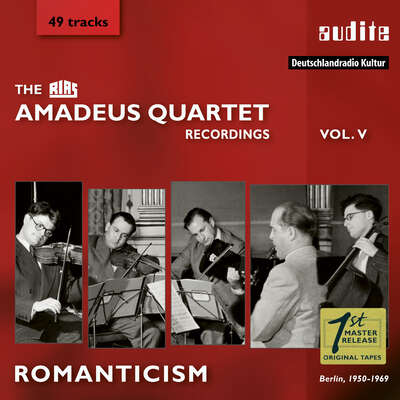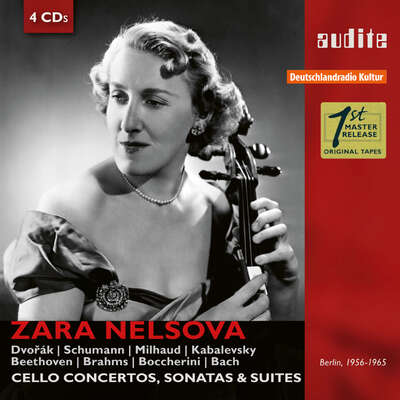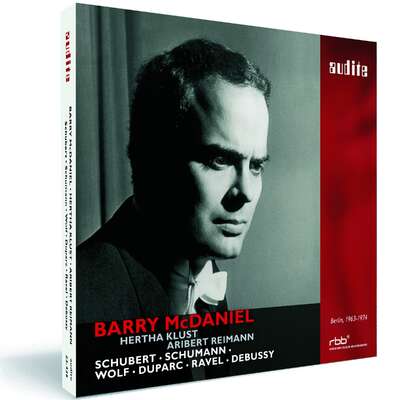
Würde man die Geschichte der Klaviermusik als eine Art Gebirgslandschaft visualisieren, so nähme das Werk Maurice Ravels in diesem Panorama ohne Frage einen Gipfel ein. Es ist ein Zentralmassiv eigener Art für jeden pianistischen „Bergsteiger“. Wohl sind das Profil, die verführerische...mehr
"Gleich die eröffnende Schubert-Hommage der „Valses nobles et sentimentales“ gestaltet er mit einem Optimum an Sensibilität und Formsinn. Ähnlich gelungen dann auch seine Wiedergabe des „Gaspard“ und der Sonatine, und die Schlusssteigerung von „La Valse“ habe ich noch nie so wenig klavierauszugsmäßig und bei aller Transparenz so rauschend „orchestral“ gehört wie von Descharmes." (Ingo Harden, Stereo)
Details
| Maurice Ravel: Piano Works | |
| Artikelnummer: | 92.571 |
|---|---|
| EAN-Code: | 4022143925718 |
| Preisgruppe: | ACX |
| Veröffentlichungsdatum: | 24. April 2009 |
| Spielzeit: | 64 min. |
Informationen
Würde man die Geschichte der Klaviermusik als eine Art Gebirgslandschaft visualisieren, so nähme das Werk Maurice Ravels in diesem Panorama ohne Frage einen Gipfel ein. Es ist ein Zentralmassiv eigener Art für jeden pianistischen „Bergsteiger“. Wohl sind das Profil, die verführerische Anziehungskraft und die Tücken dieser Werke seit langem bekannt, und nicht nur in der französischen Pianistik gehören sie zum Kanon der Klaviermusik des 20. Jahrhunderts. Dennoch stellt Ravels artifizielle, indirekte Klangwelt ihre Interpreten vor höchste Herausforderungen an Virtuosität, Klangsinn und Sensibilität. Die Werke, die der junge französische Pianist Romain Descharmes auf dieser SACD einspielt, stellen so etwas wie eine Quintessenz des Klavierwerks von Ravel dar: Von der klassizistischen Sonatine führt sie über die phantastische Welt des Gaspard de la Nuit – einem Meilenstein der Virtuosität in der Geschichte der Klaviermusik überhaupt – und die raffinierten Walzerparaphrasen der Valses Nobles et Sentimentales zur selten gespielten Transkription des weltberühmten Orchesterwerks La Valse für Klavier solo. An Descharmes’ Einrichtung des Werkes und einem Spiel, das Risiko und Kontrolle souverän miteinander verbindet, lässt sich eindrucksvoll studieren, welche Kräfte La Valse in der Klavierfassung zu entfesseln vermag – aber auch, wie sich Obsession und Tragik in Ravels Kunst gegenseitig bedingen und durchdringen.
Romain Descharmes gewann im Jahr 2006 den ersten Preis beim Internationalen Klavierwettbewerb in Dublin, der seinen Weg in die großen internationalen Konzertsäle ebnete. Darüber hinaus ist er Preisträger weiterer internationaler Wettbewerbe. Romain Descharmes studierte am Conservatoire National Supérieur de Musique in Paris bei Jacques Rouvier, Christian Ivaldi, Jean Koerner und Anne Grappotte. Seine rege Konzerttätigkeit führt ihn regelmäßig durch sein Heimatland Frankreich und ins Ausland. Zusätzlich zu seinen Soloauftritten ist Romain Descharmes auch als gefragter Kammermusikpartner tätig.
Besprechungen
www.allmusic.com | 01.05.2010 | 1. Mai 2010
In the middle years of the 20th century, the "go-to" conductor forMehr lesen
Audiophile Audition | April 2010 | John Sunier | 20. April 2010
A fine selection of four great Ravel piano works, beautifully played by aMehr lesen
Classica | février 2010 | Jacques Bonnaure | 1. Februar 2010
À trente ans, Romain Descharmes vise haut en enregistrant la moitié deMehr lesen
www.parutions.com | 24/12/2009 | Jean-Jacques Millo | 24. Dezember 2009 Super Audio CD hybride stéréo/multicanal
La musique pour piano de Maurice Ravel n'est pas monumentale par le nombreMehr lesen
Fanfare | Issue 33:2 (Nov/Dec 2009) | Peter Burwasser | 1. November 2009
First of all, the young French pianist Romain Descharmes (b. 1980) is a very fine artist, possessed of not merely great dexterity, but exceptionalMehr lesen
If, by some chance, you need this material in your CD collection, you will not go wrong with this choice. As I have commented before, the Audite label produces some of the best piano sound in the industry, exquisitely balanced and with a natural (not too close) ambience. As for me, I look forward to hearing this promising new talent again soon, in more adventurous material.
Scherzo | octobre 2009 | Santiago Martín Bermúdez | 1. Oktober 2009 Ravel: El encanto y el juego
Qué contraste entre lo percutivo del arranque de los Valses nobles yMehr lesen
CD Compact | septiembre 2009 | Benjamín Fontvella | 1. September 2009
No me extrañaría que a este primer disco se le añadiera en pocos mesesMehr lesen
Fono Forum | 9/2009 | Ingo Harden | 1. September 2009 Hoch sensibel
Audite stellt in einer Neuproduktion aus der Jesus-Christus-Kirche in Berlin-Dahlem, traditionsreichem Studioterrain also, den französischenMehr lesen
Sich mit Ravel vorzustellen ist für einen jungen französischen Conservatoire- Absolventen heute Ehrensache, erfordert allerdings angesichts der von Jahr zu Jahr unerbittlich wachsenden Diskuskon kurrenz zunehmend auch Mut. Doch Deschar mes hat nichts zu fürchten, er kann eine perfekt geschmeidige, besonders im Leisen feiner Abstufungen fähige Pianistik ins Feld führen. Sie erlaubt es ihm, in jedem der vier Werke seiner „Best of Ravel“-Auswahl – Berezowski hatte vor fünfzehn Jahren dasselbe Programm eingespielt –„Technik“ nicht als Selbstzweck auszuspielen, sondern voll in den Dienst intelligenter und expressiver Gestaltung zu stellen. Gleich die eröffnende Schu bert- Hommage der „Valses nobles et sentimentales“ gestaltet er mit einem Opti mum an Sensibilität und Formsinn. Ähn lich gelungen dann auch seine Wieder gabe des „Gaspard“ und der Sonatine, und die Schlusssteigerung von „La valse“ habe ich noch nie so wenig klavierauszugmäßig und bei aller Transparenz so rauschend „orchestral“ gehört wie von Descharmes.
Einziger Schwachpunkt der Aufnahme ist der Klang. So lobenswert es ist, von den Mikros nicht quasi in das Instrument hineingezogen zu werden – hört man es wie aus einer der hinteren Saalreihen, klingt zumindest der gewählte (Kawai-)Flügel weder sonderlich substanzreich noch brillant.
The Irish Times | Friday, August 28, 2009 | Michael Dervan | 28. August 2009
French pianist Romain Descharmes, first prizewinner of the 2006 DublinMehr lesen
Stereo | 9/2009 | Ingo Harden | 10. August 2009
Audite stellt in einer Neuproduktion aus der Jesus-Christus-Kirche inMehr lesen
Gramophone | August 2009 | Bryce Morrison | 1. August 2009 A major young talent impresses with a first disc of Ravel's solo piano music
Romain Descharmes is a 29-year-old French pianist admirably attuned to the more subtle and elusive sides of Ravel's genius. A prize-winner in manyMehr lesen
Descharmes is also admirable in the Valses nobles et sentimentales' alternating piquancy and introspection, with an epilogue that winds down to a near halt, among many individual touches. And here in particular there is never a question of “play the notes and the rest will look after itself”, a literalism once common to certain celebrated French pianists. In Gaspard Ondine's watery entreaty spurts and bubbles seductively and in “Le gibet” the bell tolls disconsolately throughout, penetrating but never obscuring the surrounding multi-layered texture. Ravel's skeletal outline in La valse is suitably filled in or “orchestrated”, and if Descharmes's dalliance occasionally weakens the music's drive as it whirls inexorably towards its cataclysmic climax, his musicianship and overall command are again striking. A more daemonic view of a waltz that outpaces Liszt at his own Mephistophelian game comes from Louis Lortie and, of course, from Argerich and Freire in the two-piano version. But Descharmes is clearly a major talent, finely recorded, and makes you look forward to what will surely be a second disc of Ravel.
RBB Kulturradio | 7. Juli 2009 | Ulrike Klobes | 7. Juli 2009
Von weitem sehe er zwar aus wie ein Schulmeister, aber eigentlich sei er ein kleiner, selbstgefälliger Dandy – so beschrieb Erik Satie einmalMehr lesen
Romain Descharmes,
Jahrgang 1980, hat in Paris Klavier, Kammermusik und Klavierbegleitung studiert und ist neben seiner erfolgreichen Pianistentätigkeit ein aktiver Kammermusiker. Diese Einspielung ist Descharmes dritte Solo-CD, auf seiner ersten hat er Werke von Debussy, Skrjabin, Schönberg und Boulez aufgenommen, auf seinem zweiten Album gibt es ausschließlich Brahms-Werke zu hören, jetzt also Ravel.
Die Werke
Descharmes Auswahl trifft quasi den Kern von Ravels Klavierwerken: Als "Einleitung" des Albums dienen die kleinen, raffinierten Walzer aus der Sammlung Valses nobles et sentimentales, es folgt der sehr fantastisch anmutende Dreiteiler Gaspard de la Nuit, auch die eher klassizistische Sonatine ist dabei, den Höhepunkt bildet aber zweifelsfrei die Klavierbearbeitung von La Valse.
Die Interpretation
Romain Descharmes spielt sehr klar und überhaupt nicht emotional aufgeladen, an einigen Stellen für manche Geschmäcker vielleicht sogar ein wenig zu unprätentiös. Er überschlägt sich nicht in den Tempi, was eine schöne Transparenz zur Folge hat. Nicht nur die schnellen Läufe bleiben so vom Verschwimmen verschont, auch die oft donnernden Akkordfolgen kommen sehr präsent zum Ausdruck, ohne einen Störfaktor zu bilden.
Alles in allem eine überaus gelungene Einspielung von höchster Virtuosität.
Piano News | Juli/August 4/2009 | Isabel Fedrizzi | 1. Juli 2009
Die Lust an der Schwelgerei, am Schweben und Schwärmen durchzieht das WerkMehr lesen
International Record Review | July/August 2009 | Julian Haylock | 1. Juli 2009
Ravel
Gaspard de la nuit. Sonatine. Valse nobles et sentimentales. La valse.
Ravel's music is so all-encompassing in its absolute integrity (every note has its exact place in an overall scheme) that it possesses an almostMehr lesen
Romain Descharmes, winner of the Dublin International Competition in 2006, remarkably combines all these qualities in interpretations that can withstand comparison with the finest of the past. His French accent is as acute and Galois-scented as Monique Haas's, his captivating spontaneity as compelling as Samson François, his harmonic pungency and weighting as telling as that of Werner Haas, and his exhilaration in the piano mechanism's colossal bass power in La valse curiously reminiscent of Horowitz.
The Ravel who emerges here is less an effeminate aesthete with a soft centre than an indomitable, macho personality of exquisitely refined taste. In tackling Valses nobles et sentimentales, most pianists attempt to impart a sense of stylistic unity to Ravel's coruscating inspirations, whereas Descharmes gives each waltz its own unique character, ensuring that the music's startling changes of mood register with full impact. One of the greatest challenges in this above all of Ravel's piano works is to characterize the music's dancing lilt and affectionate phrasing without sounding calculating and arch, a test which Descharmes passes with flying colours as he enters into each miniature's distinctive sound-world. This is compelling playing that takes the listener on a vital emotional journey, never generalizing the specific.
It is rare indeed that one encounters a performance of Gaspard de Ia nuit that has one totally forgetting the supreme technical accomplishment involved. Yet here Descharmes charms his Kawai grand into producing magical, glistening sonorities throughout 'Ondine' that, despite the pungent clarity of his playing elsewhere (not least in 'Scarbo'), suggests that he has somehow dispensed with the use of a hammer mechanism altogether. His 'Scarbo' may not be the last word in Grand Guignol, smouldering incandescence, yet its intoxicating textural allure and commendable lack of self-conscious virtuoso wizardry focuses the music's swirling changeability to a remarkable degree.
The enchanting Sonatine suits Descharmes's quicksilver tonal reactions to a tee. The central minuet is a particular triumph, its surface nostalgia and contentment subtly spiked on occasion by Ravel's gently clashing harmonies. I can't wait to hear what Descharmes makes of Miroirs and Le tombeau de Couperin.
www.ClassicsToday.com | July 2009 | Jed Distler | 1. Juli 2009
Pianist Romain Descharmes came to my attention as first-prize winner of theMehr lesen
International Piano | July/August 2009 | Guy Dammann | 1. Juli 2009
When Romain Descharmes gave his Wigmore Hall debut in January 2007, soon after winning the Dublin competition, levels of anticipation and excitementMehr lesen
Both the Brahms and the Rzewski have made it on to disc. Now it is the turn of the Ravel, marking the pianist's recording debut with Audite performing on a Kawai piano. The exceptionally bright tone of the instrument works brilliantly – literally – for the first item on the disc, Valses nobles et sentimentales. Ravel's almost casual dissonances glisten and gleam like rough-cut jewels against the warm darkness of the acoustic of Berlin's Jesus-Christus-Kirche. To the pacing and balance of these deceptive dances Descharmes brings both intelligence and independence of mind, setting down an interpretation of these exciting and sometimes underappreciated pieces that deserves attention.
Whether the same can be said of the rest of the disc is less clear. Gaspard de la nuit, on the edge of ragged in the Wigmore Hall recital, is technically much more proficient, especially where the more restrained and confident pedalling is concerned. But there is little really dazzling about 'Ondine' and 'Le Gibet'. 'Scarbo', unusually in recordings of this work, is the most convincing.
With the Sonatine, full of delights though it is, you get the slightly tired sense that Descharmes has been playing it since shortly after coming out of nappies and hasn't really thought a great deal about his approach to it since. More interesting is the pianist's own transcription of La valse. Although the composer's own two-piano version may be familiar, his solo version of the work leaves much to be desired. Descharmes's arrangement works better and his warm-blooded and somewhat flirtatious performance brings a stimulating if not totally satisfying conclusion to this somewhat frustrating disc.
www.SA-CD.net | June 22, 2009 | Polly Nomial | 22. Juni 2009 A début that augers much promise but fails to deliver in entirety
Romain Descharmes is clearly a pianist of some talent and he chooses aMehr lesen
Diverdi Magazin | 182/ junio 2009 | Ignacio González Pintos | 1. Juni 2009
Artificioso por naturaleza
Romain Descharmes se aproxima con desarmante exactitud al piano meticuloso de Maurice Ravel
Con esta ingeniosa expresión se autodefinió Maurice Ravel, y difícilmente hallaríamos otra que ilustrara mejor el especial carácter de su obra.Mehr lesen
Romain Descharmes encuentra la manera de dejarse poseer por ese espíritu acompañado de su SK-Ex 258001, un instrumento artificioso por naturaleza, no especialmente cálido y brillante incluso en la frecuente levedad dinámica, ideal para recrear la estética raveliana -estupenda la toma sonora, por cierto, de un SACD compatible con los reproductores comunes. La delicadísima pulsación del pianista acaba por obrar el milagro: la música emerge sublime, cristalina, coloreada con timbre decadente y dicha con fina poesía. Ese meticuloso relojero que fue Ravel penaliza el más mínimo desliz, y a punto está de costarle caro a Descharmes cierto encaprichamiento en Le Gibet del Gaspard de la Nuit, que solventa con un Scarbo sostenido con seductor y exacto pulso. La atmósfera de los Valses nobles y sentimentales fluye encantadora a través del juguetón ritmo ternario, empeñado en disimular la amargura que provoca la evocación del tiempo perdido. La mirada a un pasado más remoto de la Sonatina desarma por su exquisita y frágil desnudez. Desde los rápidos cuatrillos iniciales la lectura de Descharmes se desenvuelve con una delicadeza irresistible, refinada hasta el extremo.
Llegada la madurez el ascetismo de Ravel se permite algunas licencias, levantando la voz para escribir La Valse. Descharmes toma aire y nos brinda esta transcripción en un solo impulso. Una fantástica exhibición llena de energía, salpicada por un humor trágico tremendamente raveliano, que bien podría ser el punto y seguido de una integral más que apetecible.
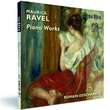



























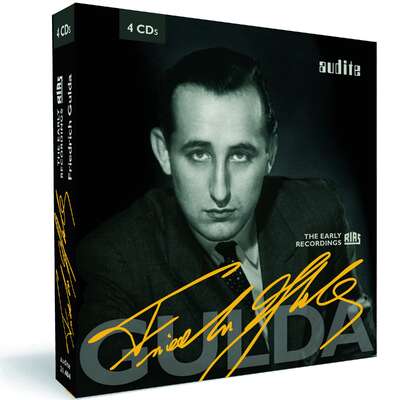
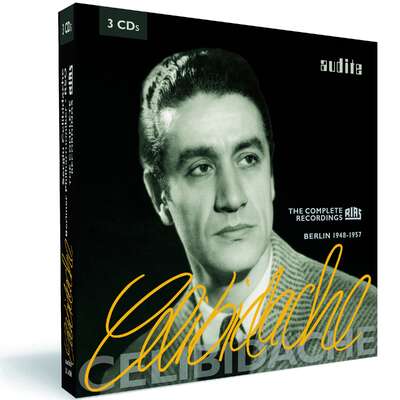
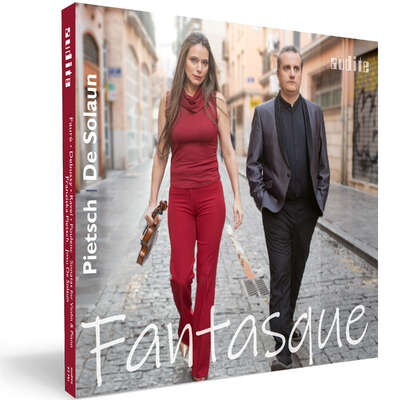
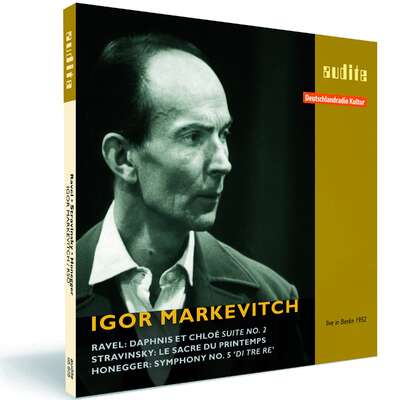
![23446 - k[NOW]n Piano](/image/product/3d/carousel/23446-known_piano.jpg)
